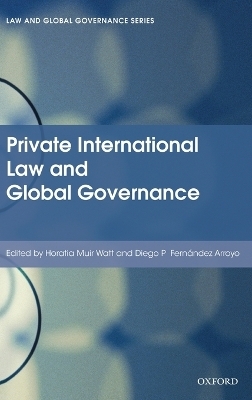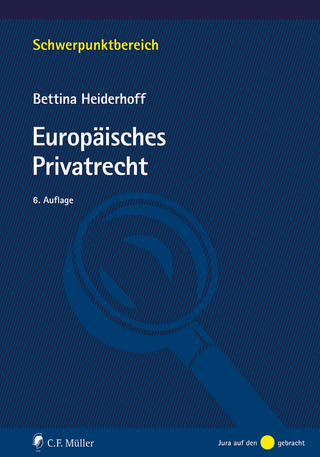
Private International Law and Global Governance
Oxford University Press (Verlag)
978-0-19-872762-0 (ISBN)
Contemporary debates about the changing nature of law engage theories of legal pluralism, political economy, social systems, international relations (or regime theory), global constitutionalism, and public international law. Such debates reveal a variety of emerging responses to distributional issues which arise beyond the Western welfare state and new conceptions of private transnational authority. However, private international law tends to stand aloof, claiming process-based neutrality or the apolitical nature of private law technique and refusing to recognize frontiers beyond than those of the nation-state. As a result, the discipline is paradoxically ill-equipped to deal with the most significant cross-border legal difficulties - from immigration to private financial regulation - which might have been expected to fall within its remit. Contributing little to the governance of transnational non-state power, it is largely complicit in its unhampered expansion. This is all the more a paradox given that the new thinking from other fields which seek to fill the void - theories of legal pluralism, peer networks, transnational substantive rules, privatized dispute resolution, and regime collision - have long been part of the daily fare of the conflict of laws. The crucial issue now is whether private international law can, or indeed should, survive as a discipline.
This volume lays the foundations for a critical approach to private international law in the global era. While the governance of global issues such as health, climate, and finance clearly implicates the law, and particularly international law, its private law dimension is generally invisible. This book develops the idea that the liberal divide between public and private international law has enabled the unregulated expansion of transnational private power in these various fields. It explores the potential of private international law to reassert a significant governance function in respect of new forms of authority beyond the state. To do so, it must shed a number of assumptions entrenched in the culture of the nation-state, but this will permit the discipline to expand its potential to confront major issues in global governance.
Horatia Muir Watt is Professor at Sciences-Po Paris, where she is Co-Director of the programme 'Global Governance Studies' within the Master's Degree in Economic Law. She gained a PhD in private international law from the University of Panthéon-Assas Paris in 1985. She is a tenured Professor in private international law and in comparative law. She taught at the University of Tours, at the University of Paris XI, and at the University of Paris I Panthéon-Sorbonne between 1996 and 2009 and was appointed to Sciences Po in 2009. She is a Member of the Institute of International Law and Editor-in-chief of the Revue critique de droit international privé (the leading French-language journal on private international law) and a member of the publication committees of numerous other legal journals. She founded the PILAGG (private international law and global governance group), now run with the LSE. Diego P. Fernández Arroyo has been professor at the School of Law of Sciences Po in Paris since 2010, and a Global Professor of New York University since 2013. He teaches subjects related to international dispute resolution, arbitration and conflict of laws. At Sciences Po he is co-director of the Global Governance Studies Program and co-director of the Research Project Private International Law as Global Governance (PILAGG). Professor Fernández Arroyo is a member of the Curatorium of the Hague Academy of International Law, a former President of the American Association of Private International Law, and a member of a number of academic institutions including the International Academy of Comparative Law, the International Academy of Commercial and Consumer Law, the International Law Association, and the International Arbitration Institute.
PART I: BEHIND CLOSED DOORS: THE PRIVATE MODEL AND ITS DISCONTENTS; SECTION A. EPISTEMOLOGICAL CHALLENGE: THE MEANING OF 'PRIVATE' IN PRIVATE INTERNATIONAL LAW; SECTION B. POLITICAL CRITIQUE: PRIVATIZATION AS HOMOGENIZATION; SECTION C. SEARCHING FOR LEGITIMACY: QUESTIONS OF DESIGN; PART II: BEYOND THE SCHISM: EMERGING MODELS AND WORLDVIEWS; SECTION A. THE GLOBAL TURN TO INFORMALITY: PRAGMATISM AND CONSTRUCTIVISM; SECTION B. RE-IMPORTING PUBLIC LAW METHODOLOGY: FEDERALISM AND CONSTITUTIONALISM; SECTION C. REINVENTING A GLOBAL HORIZON: WORKING TOWARDS A GLOBAL PUBLIC GOOD
| Reihe/Serie | Law And Global Governance |
|---|---|
| Verlagsort | Oxford |
| Sprache | englisch |
| Maße | 162 x 240 mm |
| Gewicht | 744 g |
| Themenwelt | Recht / Steuern ► EU / Internationales Recht |
| Recht / Steuern ► Öffentliches Recht | |
| Recht / Steuern ► Privatrecht / Bürgerliches Recht ► Internationales Privatrecht | |
| Sozialwissenschaften ► Politik / Verwaltung ► Europäische / Internationale Politik | |
| Sozialwissenschaften ► Politik / Verwaltung ► Staat / Verwaltung | |
| ISBN-10 | 0-19-872762-3 / 0198727623 |
| ISBN-13 | 978-0-19-872762-0 / 9780198727620 |
| Zustand | Neuware |
| Haben Sie eine Frage zum Produkt? |
aus dem Bereich


